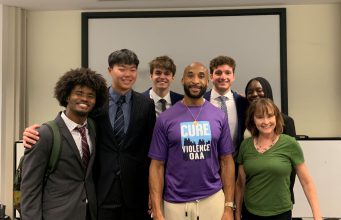 EDITOR’S NOTE: Goizueta Newsroom caught up with Wesley Longhofer, a new faculty member at Goizueta in Organization and Management.
EDITOR’S NOTE: Goizueta Newsroom caught up with Wesley Longhofer, a new faculty member at Goizueta in Organization and Management.
At a time when the role of government involvement in social welfare is looming large in the political arena, the research of Wesley Longhofer, a Goizueta Business School Assistant Professor of Organization & Management, appears to be particularly relevant.
“One of my ongoing papers looks at the origins of philanthropic foundations in 120 countries, and their response to crisis,” says Longhofer, who joined the Goizueta faculty in 2012 after receiving his PhD in sociology from the University of Minnesota. “It indicates that when government aid to developing countries decreases, foundational aid increases.”
Longhofer’s interests in sociology, philanthropy and nonprofits stem from his “intellectual curiosities into how people work together voluntarily to pursue various outcomes,” he says. “They also developed from my parents’ involvement in various charitable works when I was growing up. I also enjoy cooking, hiking, and teaching team basketball to my five-month old daughter.”
Longhofer’s research and teaching interests include sustainability, nonprofits and philanthropy, and corporate social responsibility, particularly from a global perspective.
“These are areas that are expanding and are becoming more important,” he notes. “As they grow, concepts and definitions are developing, so the research is both challenging and rewarding.”
Right now Longhofer’s paying a lot of attention to the interaction between philanthropic activities and corporations and foundations.
“One of the biggest trends we are seeing is what we might call global philanthropy,” he observes. “We’ve always had charities and foundations, but most organizations like the Bill and Melinda Gates Foundation are still relatively young. We’re also seeing the emergence of foundations in Asia, particularly in countries like China and India, where the rise appears to be a consequence of broad wealth creation and the establishment of a growing middle class and new entrepreneurs.”
Another interesting development, according to Longhofer, is that the increase in the number of philanthropic foundations does not appear to be spurred only by the appearance of crises.
“Based on my research, the act of formal giving appears to be on the rise even when there is no apparent need, although needs are certainly great,” he says. “This is not a fad. Instead it appears to be a longer-lasting trend and it will be interesting to explore the depth of the involvement of philanthropic and corporate foundations to see how far their impact reaches.”
Longhofer also hopes to study corporate foundations in greater depth.
“The emergence of corporate foundations, as compared to independent foundations, is a relatively new development,” he says. “Ongoing research being undertaken by Peter Roberts [a Goizueta Associate Professor of Organization & Management] and his students, suggests that corporate foundations tend to engage in giving activities that are more broadly based than the typical independent foundation. This may be because corporate foundations have a stakeholder base that is more broadly distributed, representing a greater variety of interests.”
Longhofer also plans to expand his research into corporate social responsibility, or CSR, a strategy under which businesses try to implement activities that yield a positive impact on the environment, consumers, employees, communities, stakeholders and others.
“My interest in corporate social responsibility is a kind of a spinoff of my existing research into philanthropic and not-for-profit activities,” Longhofer explains. “For example, why some companies disclose their environmental performance and others do not, and the implications this may have for revenue and reputation, is an exciting area of research.”
The concept of CSR continues to evolve, he adds, as more companies move to incorporate social responsibility into their strategic plans, viewing environmental sustainability and other issues as ways to trim costs.
“There are many things to examine when it comes to CSR,” says Longhofer. “What are the true costs of companies’ environmental impact, and how do you isolate and measure them? What drives companies to embrace CSR — is the push coming from internal or external actors? There are many research areas in the corporate, philanthropic and sustainability segments, to name a few, and I’m looking forward to examining them as I work with fellow faculty and students at Goizueta.”









